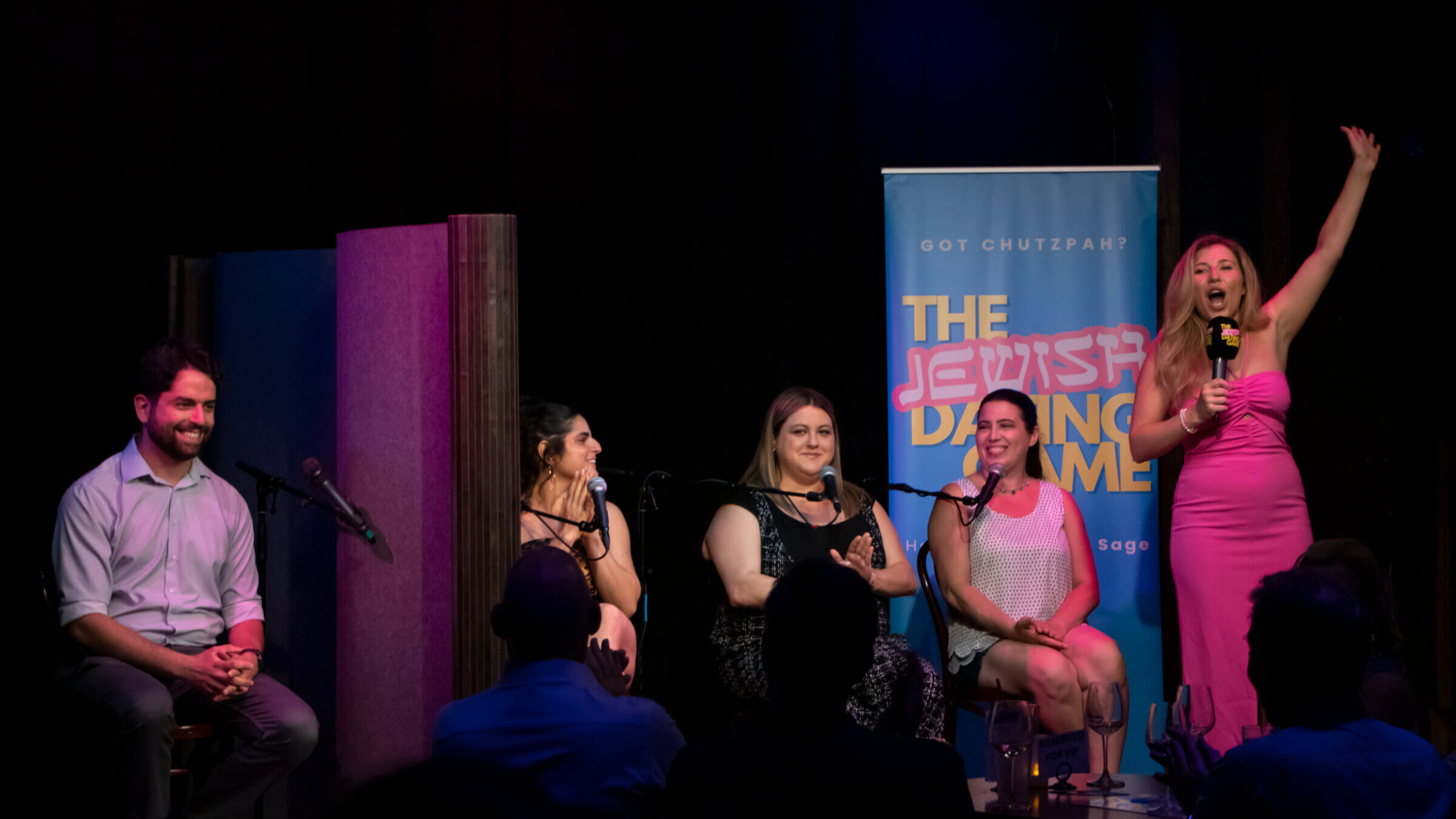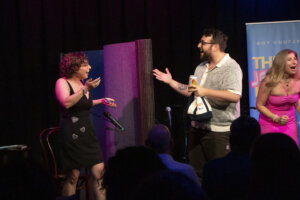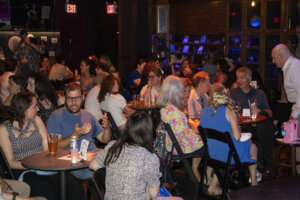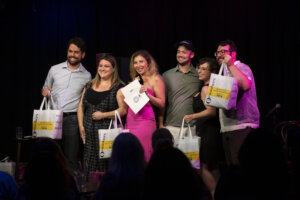21-year-old solitary Jewish female (me) seeks human contact at ‘The Jewish Dating Game’
Some Jewish singles escaped the dating app Matrix and found love the old-fashioned way. Me, I won a pack of free aikido classes.

Sparks fly across the “mechitza” during Round Two. (From left to right: The Bachelor, Bachelorettes #1, #2 and #3, and host Linnea Sage.) Photo by Gavi Loewenstein
Here’s a story about a glitch in the Matrix: It’s Round 2 at The Jewish Dating Game, and I’m sitting at a front row table. (That’s not the glitchy part — I chose this seat so that I could heckle any potential basherts at close range.) What’s inexplicable is that even though the title of this show combines at least two cortisol-inducing concepts — “Dating” and “Game” — there is not a whiff of fear in the air. The audience is whooping and clapping, and the people onstage are smiling.
The Bachelor, a handsome bearded fellow who bears a faint resemblance to Emmanuel Macron, sits on one side of the stage behind a makeshift mechitza, his hands clasped demurely in his lap. On the other side sit the three Bachelorettes. Bachelorette #1 wears a tight cheetah-print dress and a cheeky smile that I suspect must somehow be detectable even through the mechitza. She says she’s from the Bay Area, but just to abbreviate things, she’d like you to call her “Bae.” Bachelorette #2 is her friend, a steady-looking blonde from Long Island who can crack her sass like a whip. And Bachelorette #3, who has the sort of gentleness you usually only find in children or the elderly, has a sweet smile and a quiet voice. She’s lived all her life in Midwood, Brooklyn, and self-identifies as “a huge baker.” She says her mother is waiting for her grandchildren.
Like Pyramus talking through the wall to Thisbe, the Bachelor can only hear the voice of his potential bashert, not see her face. For the next half hour, he will ask the three ladies the questions that all discerning people must ask their prospective life partners: Who was your first celebrity crush? Window seat or aisle? Have you ever experienced a glitch in the Matrix where something inexplicable happened?
Then the Bachelor will pick a Bachelorette. She will cross the mechitza to meet him. The pair will produce phones from pockets and schedule an all-expenses-paid dinner date at either Shoo Shoo Nolita or 12 Chairs. The rest may very well be history.

The history of The Jewish Dating Game began a year ago, when the show’s creator and host, Linnea Sage, a voice actor with the sweetness, pinkness, and pop of bubblegum, woke up in the middle of the night with an idea — if people in the ’60s (including serial killer Rodney Alcala) had attempted to score a date on the original version of The Dating Game, then what was to stop Jews in the 2020s from finding love on a new, Semitized and sanitized version of the show?
“I woke up that morning, and I pitched the show to the owners of the theater that I perform at monthly, Caveat Theater,” Sage told me. “They said, ‘Great, you’re on in four weeks.’”
The show has run at Caveat, a basement theater on the Lower East Side of Manhattan that combines the coziness of a burrow with the edginess of a bar, every month since. Onstage, Sage, who resembles Barbie with her long pink gown and long blonde hair, has a disco-ball effect on the crowd and the contestants, dazzling on her own while also reflecting the light of others. “My job on this stage is to make Jews look good!” she crows to the crowd. “There will be no embarrassing moments up here. This is a supportive environment, and we want everybody to find love! And I promise, there is enough love to go around.”
Though The Jewish Dating Game shares DNA with its 1960s ancestor, there are a few key innovations — contestants must apply via Google Forms before they can participate, giving Sage and her husband, fellow voice-actor Paul Skye Lehrman, the opportunity to internet-stalk anybody who might give questions like “What level of Jewish are you?” a sinister twist.
Unlike the original Dating Game, where usually a female contestant picks from three beaux, The Jewish Dating Game is more egalitarian, with one round for three men to vie for a woman, and another for three women to vie for a man. Additionally, some of the questions would probably be incomprehensible to non-Jews: “On a scale from shiksa goddess to shomer negiyah, what is the inner and outer bracket that you’re comfortable with dating?” And finally, there are no names or jobs mentioned onstage, just initials.
Sage’s algorithm seems effective. “We have about a 60% success rate, and we constitute success as three dates or more,” said Lehrman, who produces and directs the show, and has the puppy-eyed good looks of a lad in an Archie comic. “Those are the successes that are made onstage. So that doesn’t even include all the successes and matches that happen offstage.”
There are usually 75 to 100 people at the show, Lehrman tells me, and after the show there’s a mingle at the pub around the corner, Donnybrook, where participants can engage in conversation, flirtatious banter, or an actual donnybrook, each according to their lights. “Folks have been watching both Linnea and eight people onstage be vulnerable, honest, and truthful with themselves,” Lehrman said. “It kind of breaks the ice for everyone in the audience, and it sets the tone for real connection when people gather and talk.”

At Donnybrook, where we Jews jostle shoulders and yell above the din as if we are haggling over goats in the shtetl marketplace, I talk with Bachelor #2 from the Men’s Round, a 31-year-old software engineer named Blake who, in the true spirit of yiddishkeit, came to the event because his mother suggested it. Blake wears a head-to-toe black outfit, which he calls his “behind-the-scenes” clothes. Behind the scenes is usually where he feels most comfortable, he says.
“When I hear my initials and I get up, my heart’s immediately racing,” Blake told me. “Just the whole time, that heartbeat is going.” Offstage, Blake’s conversational gears pick up grease and momentum when he is talking about something that fascinates him, like efficiency in AI, though he admits that this topic doesn’t usually hit a home run on the dating apps. The experience of dating, whether online or in-person, often leaves him with the feeling that “I was myself, but I wasn’t myself, you know?”
I do know. It’s time for me to make a confession — I was almost a contestant on The Jewish Dating Game. After all, as a non-homicidal Jewess with valuable assets (for example, my left foot is dramatically bigger than my right foot), I felt that I was a prime candidate to go in search of romantic connection among my kinsmen. I even filled out the Google Form, where I made vague demands about my bashert, such as that he be “a mensch,” and boasted (or threatened) that I possessed the strength of Bar Kochba.
A week or so later, when I had almost forgotten I had submitted the form at all, I got an email: “Mazal Tov! You Might Have a Match at The Jewish Dating Game!” All that bluster about the strength packed into my Maccabean muscles dissolved in a second. They might as well have swapped out “Match” for “Incurable Disease.” I was terrified.
On my trip to Caveat on Tuesday evening, I saw bad omens everywhere. An enormous grey cat with impassive green eyes watched me at the bodega where I stopped to buy some Extra Long Lasting Flavor Peppermint Gum. A woman sitting on a tree guard looked at me with contempt and yelled, “PULL UP YOUR PANTS! Yeah, I’m talking to YOU! Pull ’em up!”, which I guess wasn’t really an omen, just forcefully worded fashion advice.
But omens don’t necessarily warn people about the future; sometimes they only warn us about how we feel about the future. Omens are excuses to turn back from the unknown, to shrink away from risk — even if risk is only the other side of possibility.

I don’t know if there was any possibility between me and Jewish Emmanuel Macron. I doubt it. He was 27, practically on the point of getting hazed into the Elders of Zion. He said he envisioned himself married in five years. (I envision myself married in five years, too, but only in my nightmares.)
Still, when I think about that question that Jewish Macron asked about the Matrix, I think that I have an answer now: My Matrix of cynicism and suspicion shattered the moment that I heard Linnea call out my initials, inviting me to the stage along with the other bachelorettes. Even though I didn’t budge out of my seat, a thought flashed through my mind — in theory, I could get up from my chair, walk to the stage, and throw myself into chance and romance with chutzpah instead of fear. I could flip the coin of risk and possibility, and see how it landed.
I didn’t flip the coin this time, and I didn’t find love. But I’m not complaining. I left The Jewish Dating Game with something much better, something that will outlast any earthly romance — I won a month of free aikido classes from the show raffle.
Perhaps next month, once I’ve mastered a few joint locks, throws and pins, I’ll have the courage to flip the coin for real.















